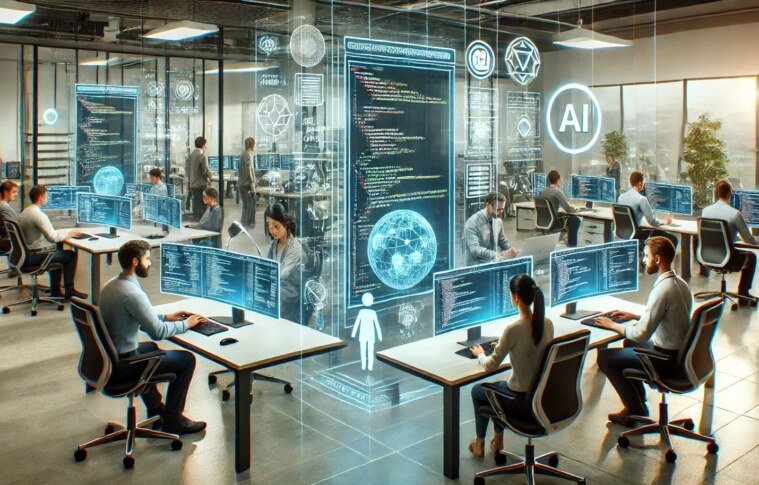Introduction
The landscape of software development has undergone significant transformation with the introduction of AI-powered tools like GitHub Copilot. Copilot, developed by OpenAI and GitHub, leverages machine learning to assist developers by generating code, suggesting optimizations, and even debugging. These tools make coding more accessible to non-experts and raise questions about the changing role of developers and the skills that will remain indispensable in an AI-driven world. This case study will explore these changes, using real-world examples, and examine what the future of software development might look like.
The Current State of Software Development
Traditional software development has been a highly specialized field, where developers needed a deep understanding of programming languages, logic, debugging, and the intricacies of frameworks. However, these skills are becoming less exclusive as AI tools like Copilot provide autocomplete features, code suggestions, and even entire function generation. The current development process involves stages such as requirement analysis, coding, testing, deployment, and maintenance, often involving repetitive tasks that AI can now automate. This automation is seen as a way to speed up development processes and free up developers to focus on more strategic tasks.
Introducing GitHub Copilot: A Paradigm Shift
GitHub Copilot is a tool designed to work alongside developers within their integrated development environments (IDEs) to suggest lines of code, entire functions, and even entire code blocks based on natural language input. By leveraging OpenAI’s Codex model, Copilot has the potential to enhance productivity by reducing repetitive coding tasks.
- Real-time Example: Microsoft: Microsoft has incorporated GitHub Copilot into its developer workflows, leading to a 30% reduction in time spent on repetitive coding tasks. This efficiency gain has allowed engineers to focus on solving more complex challenges, such as optimizing performance and refining product architecture.
Empowering Non-Experts and Expanding Accessibility
AI-assisted coding tools like Copilot lower the barrier to entry for software development. Non-experts, such as project managers, designers, and data analysts, can now write basic scripts and contribute to automating tasks without requiring deep coding knowledge. For instance, a marketing manager could use Copilot to write a Python script for automating report generation or a finance professional might use it to develop simple data analysis tools.
At the same time, these tools help junior developers or those with limited experience get up to speed faster by handling boilerplate code and suggesting more efficient solutions. As a result, software development is becoming more accessible to a wider range of professionals, democratizing the ability to create software solutions.
The Risks of Over-Reliance on AI Tools
While AI tools like Copilot can drastically improve productivity and accessibility, there are significant risks to relying too heavily on them. One such risk is the potential atrophy of essential programming skills. If developers become too reliant on these tools for code generation, they might lose their proficiency in debugging, troubleshooting, and understanding the deeper logic behind the code they write.
Additionally, AI-generated code can sometimes be inaccurate, inefficient, or insecure. An over-reliance on these suggestions without adequate knowledge of underlying principles could result in poorly optimized or even vulnerable code, as seen in real-world incidents where developers have accidentally introduced bugs or security flaws based on AI-suggested code.
Challenges and Ethical Questions
Several ethical concerns arise when using tools like Copilot:
- Intellectual Property: Copilot is trained on vast amounts of publicly available code, and there have been legal debates regarding whether it inadvertently reproduces copyrighted code from public repositories. This raises the question of who owns AI-generated code and whether companies are at risk of inadvertently using proprietary code.
- Code Quality and Security: AI tools may generate suggestions that do not adhere to best practices, leading to insecure or suboptimal code. This is particularly concerning in industries like finance or healthcare, where security is paramount.
- Shifting Skill Priorities: The role of the developer is shifting. While traditional skills like deep coding knowledge remain important, new skills are emerging that focus on using AI tools effectively, understanding the ethical implications of AI-generated content, and applying critical thinking to ensure quality and security.
The Future of Developer Roles and Essential Skills
With the growing integration of AI into software development, it’s clear that the role of a developer will evolve. While AI tools like Copilot can handle many of the routine and repetitive tasks traditionally performed by developers, they cannot replace the need for human oversight, problem-solving, and critical thinking. Some of the essential skills that will remain important include:
- Critical Thinking and Problem Solving: AI tools can generate code, but human developers will still need to define the problem, design the solution, and ensure that the code works in context.
- Debugging Expertise: Developers must understand how to debug and troubleshoot issues that arise, especially when dealing with AI-generated code that might not always work as expected.
- Collaboration and Communication: Developers will still be needed to work with business stakeholders to translate requirements into technical solutions and to ensure that software aligns with organizational goals.
Alongside these traditional skills, new competencies will be required. AI literacy will become increasingly important, as developers will need to understand how AI tools work and how to interpret their suggestions. Additionally, ethical awareness will be critical, as developers will be responsible for ensuring that AI-generated code adheres to security and intellectual property standards.
Corporate Case Study: OpenAI’s Use of Copilot
OpenAI, the creator of GitHub Copilot, uses the tool internally for its own software development. The company has observed significant productivity improvements, with a reduction in time spent on routine coding tasks. However, OpenAI has also encountered challenges, particularly when it comes to ensuring the security and quality of AI-generated code. They have emphasized the need for human oversight in interpreting AI suggestions and have developed internal guidelines to ensure that AI-generated code adheres to ethical standards and best practices.
The key lesson from OpenAI’s experience is that while AI tools like Copilot can greatly enhance productivity, they are most effective when used in conjunction with human expertise. Developers must be trained to use these tools effectively, ensuring that they are applied to tasks where they can add the most value without sacrificing quality or security.
Implications for the Broader Industry
- Startups: AI-assisted development tools offer startups the opportunity to reduce costs and speed up development cycles. A health tech startup, for example, could use Copilot to accelerate the launch of a telehealth platform by quickly generating code for common features like appointment scheduling and payment processing.
- Enterprise Organizations: Larger organizations can use AI tools to improve the efficiency of their development teams. For example, Salesforce uses AI tools to streamline the development of its CRM platform, allowing developers to focus on adding innovative features rather than reinventing the wheel for routine tasks.
- Education and Workforce Development: As AI tools become more mainstream, coding bootcamps and educational institutions are incorporating these tools into their curricula. General Assembly, for example, has launched an AI-assisted coding course that teaches developers how to use tools like Copilot effectively, ensuring that they can harness the power of AI without losing the core competencies of traditional software development.
Conclusion
AI-assisted coding tools like GitHub Copilot are reshaping the software development industry, making it more accessible and productive while raising important questions about the future role of developers. While AI can handle many aspects of coding, human expertise will remain essential for problem-solving, debugging, and ensuring code quality and security. As developers adapt to these tools, new skills like AI literacy and ethical awareness will become critical. By embracing AI tools in a responsible and strategic manner, organizations can ensure that their development teams remain at the forefront of innovation, while continuing to prioritize quality, security, and creativity.



